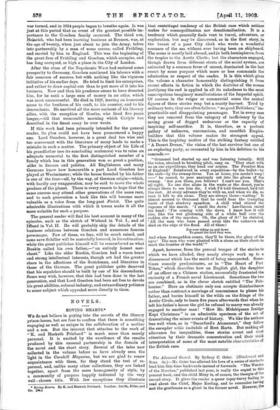NOVELS.
ROVING HEARTS.*
WE do not believe in prying into the secrets of the literary prison-house, but are free to confess that there is something engaging as well as unique in the collaboration of a mother and a son. But the interest that attaches to the work of "K. and Hesketh Prichard" is much more than merely personal. It is excited by the excellence of the results produced by this unusual partnership in the domain of the novel and the short story. Several of the tales now collected in the volume before us have already seen the light in the Cornhill Magazine, but we are glad to renew acquaintance with them, for they stand the test of re. perusal, and, unlike many other collections, they are linked together, apart from the mere homogeneity of style, by a community of purpose happily indicated by the very well - chosen title. With few exceptions they illustrate
• Hoeing Estes. By K. and Heaketb Prichard. London : Smith, Elder, and Co. Oa
that centrifugal tendency of the British race which neither makes for cosmopolitanism nor denationalisation. It is a tendency which generally finds vent in travel, adventure, or exploration, but may be discovered, as in the first story, in the breast of a poor City clerk who wrote a wonderful romance of the sea without ever having been on shipboard. The scene is mostly laid abroad, and in both hemispheres, from
the tropics to the Arctic Circle ; but the characters engaged, though drawn from different strata of the social system, are animated by a common fever of unrest, dominated in the last resort by some purpose which more or less commands the
admiration or respect of the reader. It is this which gives the volume a character honourably distinguishing it from recent efforts in fiction in which the doctrine of the means justifying the end is applied in all its nakedness to the most unscrupulous imaginary manifestations of the Imperial spirit.
Of success in the vulgar or commercial sense the central figures of these stories reap but a scanty harvest. Tried by ordinary tests, they are often failures, "no good Britishers," im- practicable and disappointing personages. Yet in every case they are removed from the category of inefficiency by the saving grace of dogged endeavour or the capacity of inspiring self-sacrifice. It is, therefore, as a portrait gallery of unknown, unconscious, and unselfish Empire- builders that this volume makes its strongest appeal. This is the inspiring motive of the striking fantasy entitled "A Desert Dream," the vision of the last survivor but one of an exploring party, as recounted by him in his delirium to his comrade
"Grammel had started up and was listening intently. Still the voice, strained to breaking pitch, rang on. 'They start with us on our expeditions, they head our armies. The Frontier Men of England ! Reinforced in every expedition—by the bullet—by the stab—by the swamp-fever. You at home, you needn't weep ! ' he ceased, to peer anxiously out into the gloom of the swamp. 'Are you there, you fellows ? I can't see you. That's all right. No one dies alone in the waste or the desert, you're always there to see him die. I wish I'd told Grammel, he'd tell the rest. At every advance they're with us, and when we die, no man is left to die alone. They are always there—waiting.' It almost seemed to Grammel that he could hear the trampling hoofs of that shadowy squadron. A chill wind stirred the
vapours of the marsh. smell the dawn.' Lee-Carson raised his head : I'm coming with the dawn. I know how it will rise, like the wet glistening side of a white bull over the sodden rim of the marshes. Oh, the glory of it" he shrieked. All the men who have passed away into the unknown and died on the edge of the flood. All of them !
For ever riding up and down To guard the land they won.
And when Armageddon comes, they'll be there, the glory of the ages! The men who were planted with a stone on their chests to mark the frontier of the world."
Apart, however, from the general temper of the stories to which we have alluded, they nearly always work up to a denouement which has the merit of being unexpected. Some- times comedy predominates, as in "The Heart of Fort Tcheu," which describes how an English girl, the daughter of an officer on a Chinese station, successfully frustrated the curiosity of a French naval Lieutenant. Sometimes the two are combined, as in the clever sketch entitled "The Pelt- hunter." Here an obstinate only son accepts disinheritance rather than contract a marriage of convenience to please his father, and buries himself in the wilds on the fringe of the Arctic Circle, only to learn five years afterwards that when he left his father's house the girl he refused to marry was already engaged to another man! "How Mr. Midshipman Irnidge Kept Christmas" is an admirable specimen of the art of dramatising the minor events of history. We like the authors less well when, as in " Smoxford's Atonement," they follow the exemplar vitiis imitabile of Bret Harte. But making all allowance for inequalities, these stories arrest and rivet attention by their dramatic concentration and their vivid interpretation of some of the moat notable characteristics of the British race.






































 Previous page
Previous page